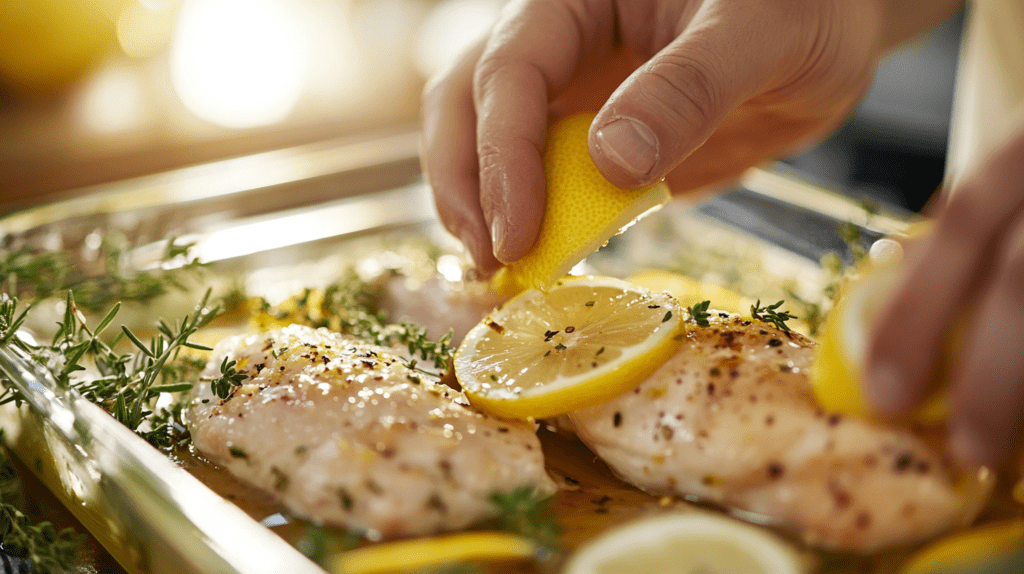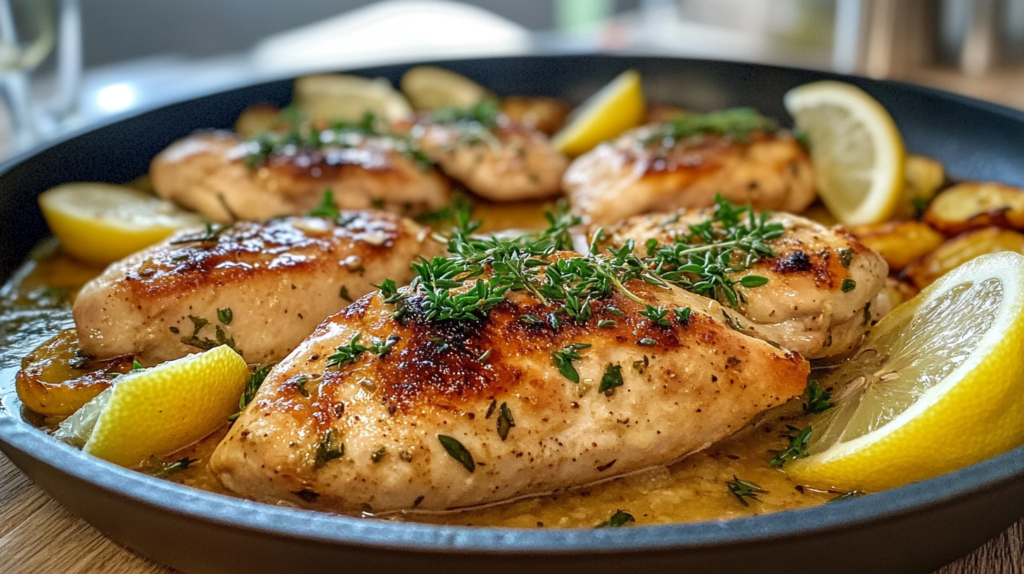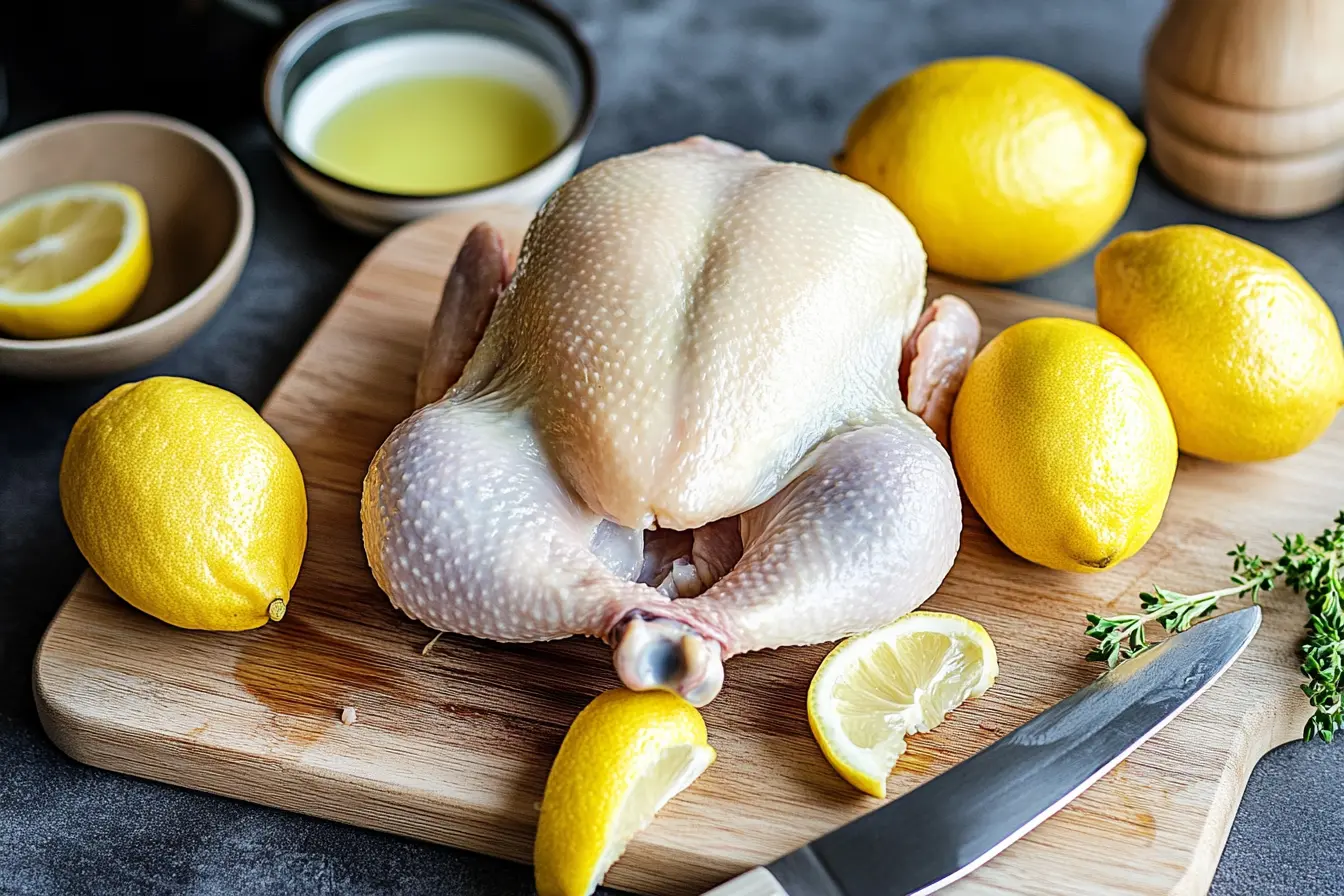Introduction
Why do you rub lemon on chicken before cooking? When preparing chicken, countless techniques promise to enhance flavor, texture, and tenderness. Yet, one method stands out: rubbing lemon on chicken before cooking. This age-old culinary practice not only enriches the taste but also comes with fascinating scientific benefits. In this article, we’ll dive into the reasons why lemon is such a popular ingredient for chicken preparation, exploring the science, culinary applications, and expert tips that make it an indispensable tool in the kitchen.
The Culinary Practice
What Does Rubbing Lemon on Chicken Involve?
At its core, this practice is as simple as it sounds: rubbing fresh lemon juice or slices over the chicken before cooking. It’s a time-tested tradition across many cultures, serving both functional and flavorful purposes. For starters, the acidic properties of lemon help to tenderize meat, making it juicier and more delectable after cooking. But there’s more! Lemon also acts as a mild cleanser, removing unwanted odors from raw chicken.
Historically, this method has roots in Mediterranean and Middle Eastern cuisines, where citrus fruits are culinary staples. The technique has since spread globally, thanks to its effectiveness and simplicity. Beyond tradition, science plays a big role here too—lemons, rich in citric acid, create the perfect environment for breaking down proteins and infusing tangy flavors.
Common Methods of Using Lemon on Chicken
Rubbing Lemon on the Chicken Skin
One of the easiest approaches involves rubbing a lemon half directly onto the chicken’s skin. This not only imparts a zesty aroma but also prepares the skin for a crispier texture when roasted or grilled. The natural oils in the lemon peel contribute additional fragrance and flavor.
Using Lemon Juice in Marinades
Lemon juice shines as a key ingredient in marinades. Combined with olive oil, garlic, and herbs, it helps penetrate the meat, creating a delightful blend of flavors. Whether soaking chicken thighs for grilling or marinating a whole bird overnight, lemon juice works wonders.
Pairing Lemon with Herbs and Spices
Why stop at lemon? Pair it with rosemary, thyme, or garlic for a dynamic flavor profile. Adding spices like paprika or cumin can balance the tanginess, creating dishes with bold and layered tastes.
The Science Behind It
Why Lemon Works: The Chemistry Behind the Technique
Rubbing lemon on chicken isn’t just a flavor hack—it’s backed by science! The secret lies in the acidic properties of lemon, specifically citric acid. This acid has a remarkable ability to break down proteins in chicken, which is why it’s often referred to as a natural tenderizer. When proteins are broken down, the chicken becomes softer, making it easier to chew and more enjoyable to eat.
Moreover, citric acid helps chicken absorb flavors more effectively. By creating tiny channels within the meat, lemon juice allows herbs, spices, and other seasonings to seep deeper, enhancing every bite. It’s like creating a flavor highway straight to the core of the chicken!
Lemon doesn’t just affect texture and flavor—it also contributes to color. The mild acidity prevents browning caused by oxidation, giving cooked chicken a vibrant, appetizing look.
Does Lemon Help Kill Bacteria on Chicken?
Here’s where things get a bit controversial. While many people believe that rubbing lemon juice on chicken helps kill bacteria, the truth is a bit more nuanced. Lemon’s acidity can inhibit the growth of some bacteria, but it’s not a substitute for proper food safety practices. The U.S. Department of Agriculture (USDA) advises against relying solely on lemon or vinegar for sanitizing raw poultry. Instead, focus on thorough cooking, which ensures harmful bacteria like Salmonella are effectively neutralized.
Still, the cleaning properties of lemon juice can help remove surface residue and unwanted odors, making it a valuable pre-cooking step. If you’re combining lemon with proper cooking methods, you’re giving your chicken a head start in both safety and taste. For more on safe handling practices, visit Safe Cooking Practices for Poultry.
Culinary Benefits of Using Lemon
Enhancing Flavor with Lemon
When it comes to boosting flavor, lemon juice is in a league of its own. Its sharp, tangy notes create a natural balance that complements chicken’s mild taste. Unlike overpowering seasonings, lemon gently enhances the dish without masking other flavors.
Balancing Sweet, Sour, and Savory Flavors
Lemon’s unique ability to bridge the gap between sweet, sour, and savory makes it an essential ingredient for well-rounded recipes. Adding a splash of lemon juice to roasted chicken can transform a simple dish into something unforgettable.
Lemon’s Role in Creating Depth of Taste
Ever notice how some chicken dishes taste one-dimensional? Lemon fixes that! Its acidity brightens flavors, adding a depth that brings out the best in every ingredient.
Tenderizing Chicken with Lemon Juice
If you’ve ever bitten into a perfectly tender piece of chicken, there’s a good chance lemon played a role. The citric acid in lemon gently breaks down muscle fibers, making the meat softer without turning it mushy. This process, called denaturation, is the secret behind restaurant-quality chicken.
However, moderation is key. Leaving chicken in a lemon-based marinade for too long can over-tenderize it, resulting in a slightly “cooked” texture even before it hits the heat. Aim for 30 minutes to 2 hours to achieve the perfect balance.
Lemon as a Natural Cleaning Agent for Chicken
Lemon’s reputation as a natural cleanser extends beyond kitchen counters. When used on raw chicken, it can help remove unwanted odors and surface impurities. While it’s not a replacement for washing your hands or utensils after handling poultry, it adds an extra layer of freshness to your preparation process.
Practical Applications
Best Practices for Using Lemon on Chicken
When it comes to preparing chicken with lemon juice, getting the technique right is crucial. Overdoing it can lead to overly acidic or mushy chicken, while underusing it might not achieve the desired effect. Here are some tips to master the art of using lemon:
Dos and Don’ts
- Do: Use freshly squeezed lemon juice. Pre-packaged lemon juice often contains preservatives that alter its flavor.
- Do: Rub lemon on the chicken right before seasoning for optimal flavor absorption.
- Don’t: Leave the chicken soaking in lemon juice for too long, as it may partially cook the meat due to its high acidity.
- Don’t: Rely solely on lemon for tenderizing if your recipe requires a complex marinade.
Choosing the Right Type of Lemon
Not all lemons are created equal! Meyer lemons, for instance, are sweeter and less acidic than regular lemons, making them ideal for delicate flavors. On the other hand, standard lemons are perfect for creating bold and zesty chicken dishes. Always select lemons that are firm, heavy for their size, and free of blemishes for the best results.
Recipes Highlighting Lemon-Infused Chicken
Lemon isn’t just a preparation tool; it’s a star ingredient that shines in countless recipes. Below are three delicious ways to incorporate lemon on chicken in your cooking.

Lemon Herb Roasted Chicken
A classic choice for family dinners, this dish combines the tanginess of lemon with the earthy flavors of rosemary, thyme, and garlic. The chicken is marinated in a mixture of lemon juice, olive oil, and herbs, then roasted to golden perfection.
Lemon Garlic Grilled Chicken
Ideal for outdoor gatherings or quick weeknight meals, this recipe involves marinating chicken breasts in lemon juice, minced garlic, and a touch of honey. The result is a slightly charred, beautifully caramelized chicken that’s bursting with flavor.
Lemon Butter Chicken Skillet
For a one-pan meal, try sautéing chicken in a mixture of lemon juice, butter, and chicken broth. Add spinach or asparagus for a complete, healthy dinner that’s ready in minutes.

Addressing Concerns
Can Lemon Over-Tenderize or “Cook” the Chicken?
While lemon juice is an excellent tenderizer, it’s possible to go too far. The high acidity of lemon can start breaking down chicken proteins too aggressively if left on too long, resulting in a texture that feels slightly “cooked” even before heat is applied. This is why timing is critical—limit your marinade time to avoid an overly soft or mushy texture.
Does Lemon Change the Chicken’s Texture Unfavorably?
Acidity, when used in moderation, enhances chicken’s natural texture, making it tender without compromising its firmness. However, if you notice a slimy or mushy feel, it’s likely because the lemon juice was left on for too long or used in excessive amounts. Always strike a balance by following recipe guidelines and experimenting with timing.
Frequently Asked Questions
Does Lemon Remove Odor from Chicken?
Yes, it does! Lemon is a natural deodorizer, thanks to its high citric acid content and fresh, zesty aroma. Rubbing lemon juice on raw chicken helps neutralize any unpleasant smells caused by natural poultry odors. This is particularly useful when preparing chicken that’s been stored for a while or when the bird has a slight “gamey” scent. For the best results, combine lemon juice with a bit of salt, which acts as a gentle abrasive to further clean the surface.
Can Lemon Substitute Other Marinade Ingredients?
Lemon is a versatile ingredient that can replace several marinade components, especially when you’re looking for acidity. If a recipe calls for vinegar or wine, you can often swap it with lemon juice for a tangy twist. However, keep in mind that lemon’s distinct citrus flavor may alter the overall taste profile. For a balanced marinade, consider blending lemon with olive oil, garlic, and herbs to complement its bright acidity.
How Long Should Lemon Be Left on Chicken Before Cooking?
Timing is everything! For most recipes, 30 minutes to 2 hours is the sweet spot for letting lemon work its magic. If you’re using a lemon-based marinade, avoid leaving the chicken submerged for more than 2 hours, as the acid can start to “cook” the meat and impact its texture. For a quick rub-down with lemon juice or slices, 10 to 15 minutes is plenty before moving on to seasoning and cooking.
Is It Safe to Use Lemon on Raw Chicken?
Absolutely! Using lemon juice on raw chicken is safe and can enhance the meat’s preparation. That said, it’s important to handle the process carefully. Always wash your hands, utensils, and surfaces thoroughly after dealing with raw chicken to avoid cross-contamination. While lemon helps with cleaning and flavoring, it doesn’t eliminate harmful bacteria entirely, so proper cooking is still essential.
Are There Any Alternatives to Lemon for Similar Effects?
If you’re out of lemons, don’t worry—there are substitutes that can mimic its acidic and tenderizing properties. Vinegar (especially apple cider or white vinegar) works well as an alternative, as does lime juice for a similar citrus profile. For a milder flavor, try using yogurt or buttermilk, which also tenderize meat while adding a creamy undertone.
Conclusion
Wrapping Up: Why Lemon Is a Chicken’s Best Friend
Whether you’re aiming to enhance flavor, improve texture, or simply elevate your chicken dishes, rubbing lemon on chicken before cooking is a game-changing technique. From its ability to tenderize meat and remove odors to its role as a natural flavor enhancer, lemon is a kitchen staple with endless versatility. By mastering this simple yet powerful method, you can transform your chicken recipes into culinary masterpieces that are sure to impress.

